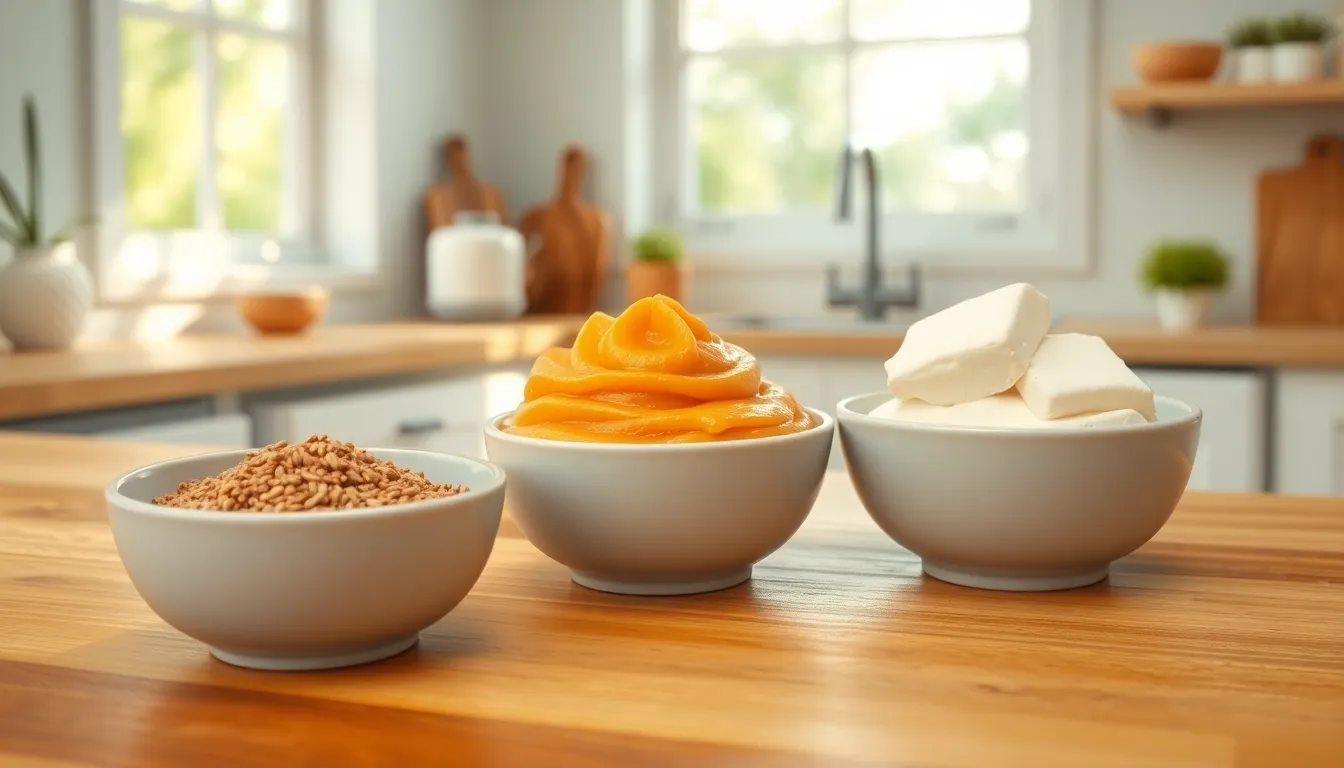The Best Fluffy Pancakes recipe you will fall in love with. Full of tips and tricks to help you make the best pancakes.

Baking Recipes Without Eggs: Delicious Alternatives for Everyone
Baking without eggs might sound like a culinary challenge, but it’s actually a delicious adventure waiting to unfold. Whether you’re vegan, allergic to eggs, or just ran out of them during a midnight baking spree, the world of eggless baking is filled with delightful surprises. Who knew that mashed bananas and applesauce could be the secret superheroes of your favorite recipes?
Baking Recipes Without Eggs
Baking without eggs offers numerous advantages that appeal to a wide range of bakers. This method encourages creativity and inclusivity in the kitchen.
Health Considerations
Eggless baking often leads to lighter recipes with lower cholesterol levels. It can also reduce saturated fat intake, particularly with healthier alternatives like avocado or flaxseed. Many egg substitutes, such as puréed fruits, add fiber and vitamins, enhancing nutritional value. Individuals with specific dietary concerns often appreciate these health benefits, making baked goods more accessible and appealing.
Dietary Restrictions
Baking without eggs caters to various dietary restrictions, accommodating those who follow a vegan lifestyle or have egg allergies. Many recipes designed to substitute eggs utilize common ingredients found in most kitchens, such as applesauce or yogurt. This accessibility simplifies meal preparation for diverse dietary needs. Furthermore, eggless recipes often feature gluten-free options, appealing to people with gluten sensitivities or celiac disease. By embracing eggless baking, individuals can enjoy a broader range of tasty treats without compromising their dietary requirements.
Common Egg Substitutes

Egg substitutes play a crucial role in baking without eggs. Various options exist, each serving different purposes in recipes. They enhance flavor, improve texture, and provide moisture.
Flaxseed Meal
Flaxseed meal acts as a popular egg replacement due to its binding properties. To create a substitute, combine one tablespoon of flaxseed meal with three tablespoons of water, letting it sit for about five minutes. This mixture forms a gel-like consistency that mimics the texture of an egg. Rich in omega-3 fatty acids, flaxseed meal also boosts the nutritional profile of baked goods. Use this substitute in cookies, muffins, or pancakes for added nuttiness and moisture.
Applesauce
Applesauce serves as a versatile egg substitute, offering natural sweetness and moisture to baked items. A quarter cup of unsweetened applesauce can replace one egg in various recipes. It works especially well in cakes, brownies, and quick breads. Not only does applesauce contribute to a soft texture, but it also keeps the final product lower in fat. This alternative adds fiber and vitamins, making it a healthy option for various dietary needs.
Silken Tofu
Silken tofu provides a creamy consistency that makes it an excellent egg alternative. When blended, a quarter cup of silken tofu can substitute one egg seamlessly. This ingredient is ideal for recipes requiring a rich texture, such as brownies or custards. Packed with protein, silken tofu enhances the nutritional value of baked goods. Additionally, it remains neutral in flavor, ensuring it won’t alter the taste of the final product.
Baking Recipes Without Eggs
Baking without eggs opens up a world of delicious possibilities. Here are some great recipes to try.
Eggless Chocolate Cake
An eggless chocolate cake delivers rich flavor and moist texture. Use one cup of unsweetened applesauce to replace three eggs for a fudgy consistency. Combine one and a half cups of flour, one cup of sugar, and a half cup of cocoa powder in a bowl. Mix in a cup of water, a quarter cup of vegetable oil, and a tablespoon of vanilla extract. Bake the mixture at 350°F for 30 to 35 minutes. This cake remains a crowd favorite for those who enjoy deep chocolate flavors without eggs.
Vegan Banana Bread
Vegan banana bread makes for a healthy and satisfying treat. For this recipe, replace one egg with a quarter cup of mashed bananas. Combine three ripe bananas, one third cup of maple syrup, and a quarter cup of melted coconut oil. Stir in one and a half cups of flour, one teaspoon of baking soda, and a pinch of salt. Bake at 350°F for about 50 minutes. The result is a moist, flavorful bread perfect for breakfast or a snack.
Egg-Free Cookie Variations
Egg-free cookies come in various tasty forms. One popular option includes using flaxseed meal as an egg substitute. Mix one tablespoon of flaxseed meal with three tablespoons of water, letting it sit for five minutes until it thickens. Blend two cups of flour, one cup of brown sugar, and half a cup of dairy-free chocolate chips. Incorporate the flax mixture and bake at 350°F for 10 to 12 minutes. These cookies offer a delightful crunch and sweetness while adhering to dietary needs.
Tips for Successful Baking Without Eggs
Baking without eggs offers unique challenges and opportunities. Specific adjustments enhance the process and outcomes.
Adjusting Baking Times
Adjustments to baking times may be necessary when omitting eggs. Recipes often require about five to ten minutes less or more baking time, depending on the substitute used. Using a toothpick or cake tester helps determine doneness effectively. Checking baked goods a few minutes earlier than the recommended time ensures optimal texture and moisture retention. Different ingredients interact variably with heat, so consistency may vary across recipes.
Moisture Control
Moisture control plays a crucial role in eggless baking. Replacing eggs with alternatives like applesauce or yogurt adds moisture to recipes. Substituting one egg with a quarter cup of these ingredients yields desirable results. Monitor the dough or batter’s consistency; it may need slight adjustments with flour or liquid. Using ingredients like flaxseed meal or silken tofu can also help maintain moisture while providing structure. Balancing these elements results in well-textured baked goods.
Conclusion
Baking without eggs opens up a world of delicious possibilities. It encourages creativity and inclusivity in the kitchen while catering to various dietary needs. With simple substitutes like applesauce and flaxseed, anyone can enjoy flavorful treats that are lighter and often healthier.
The versatility of eggless recipes ensures that everyone can indulge in baked goods without compromising taste or texture. Whether it’s a rich chocolate cake or a moist banana bread, these alternatives prove that eggless baking can be both satisfying and enjoyable. Embracing eggless baking not only enhances the culinary experience but also fosters a sense of community among bakers of all backgrounds. So grab those substitutes and start experimenting; the results might surprise you.
